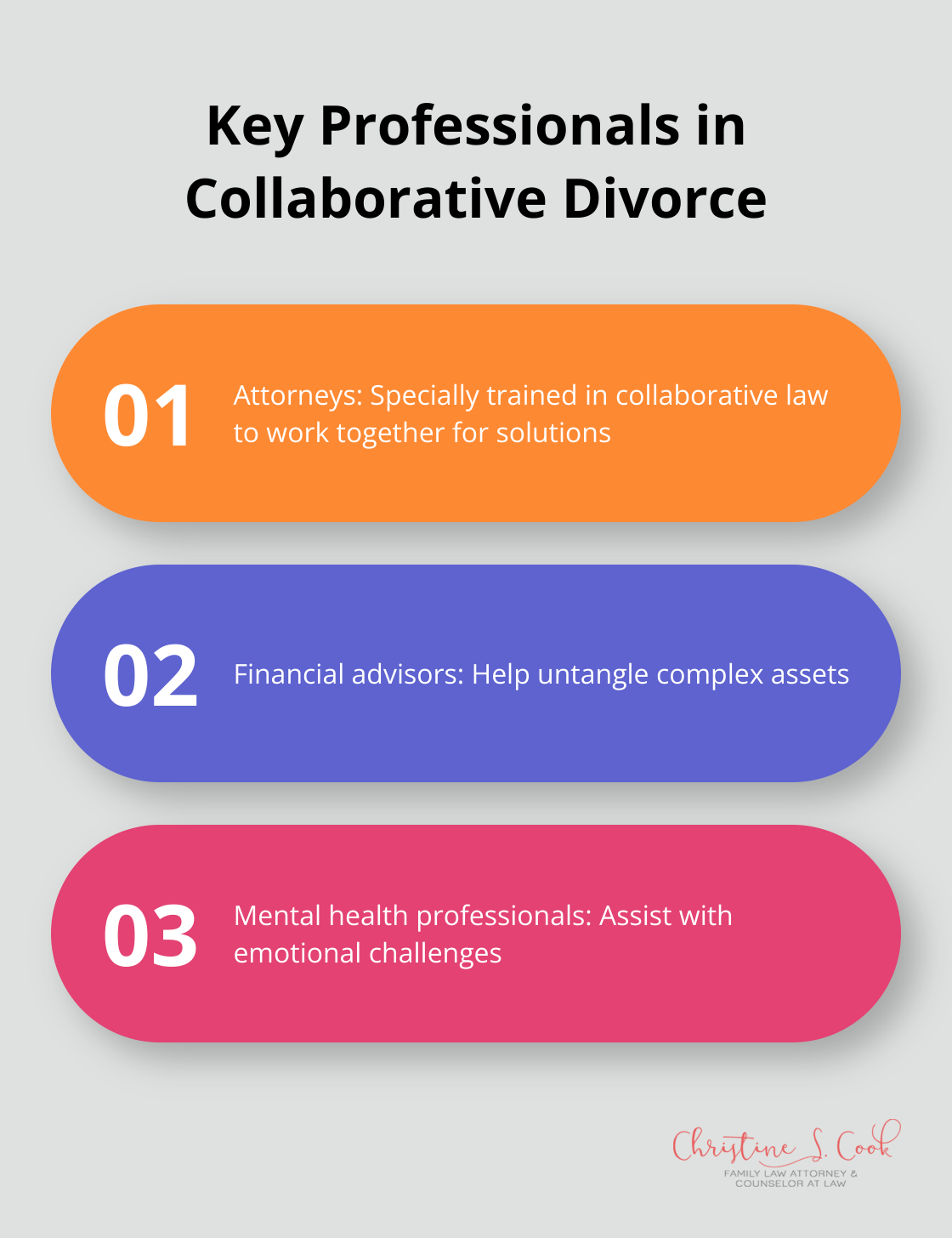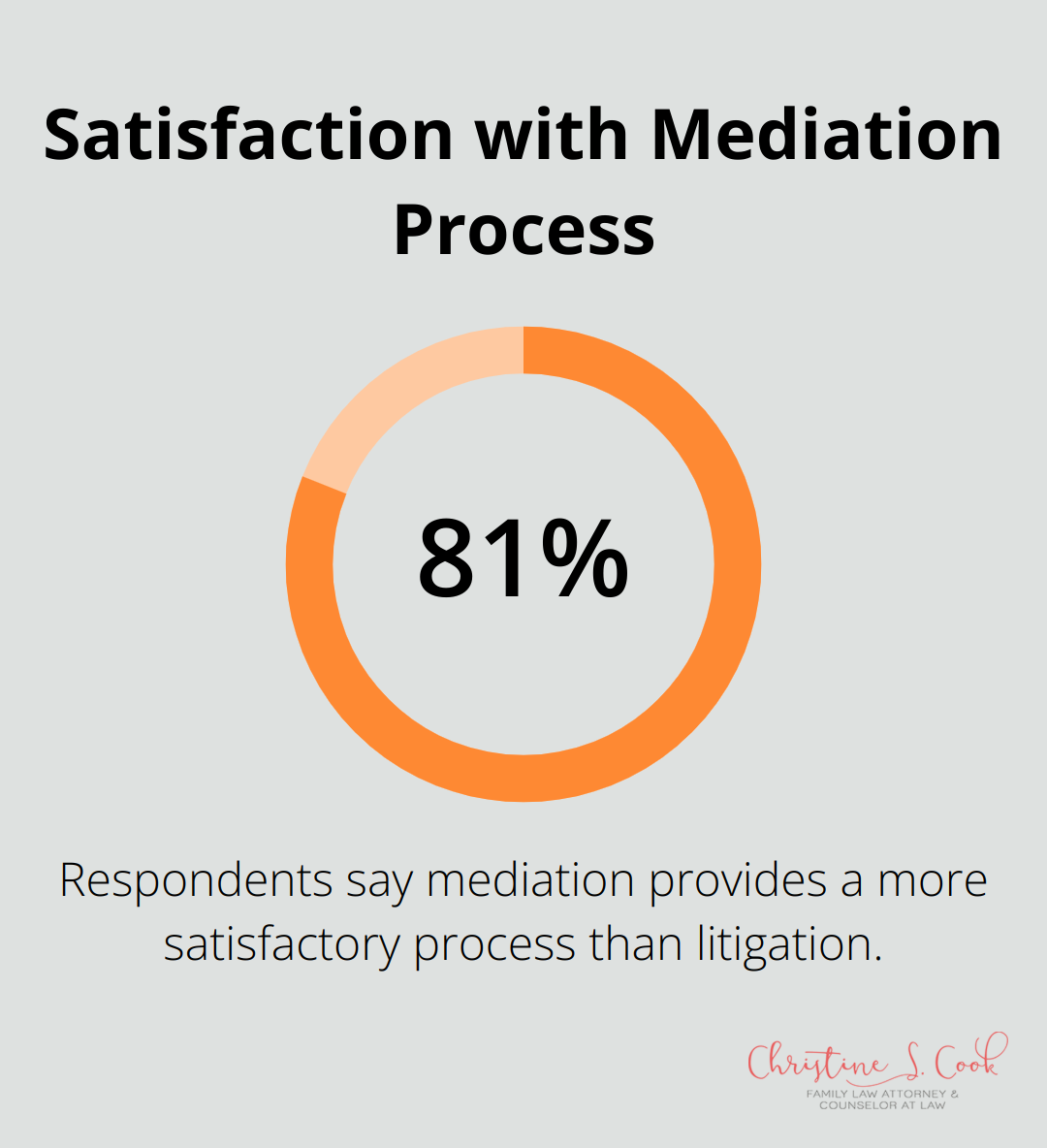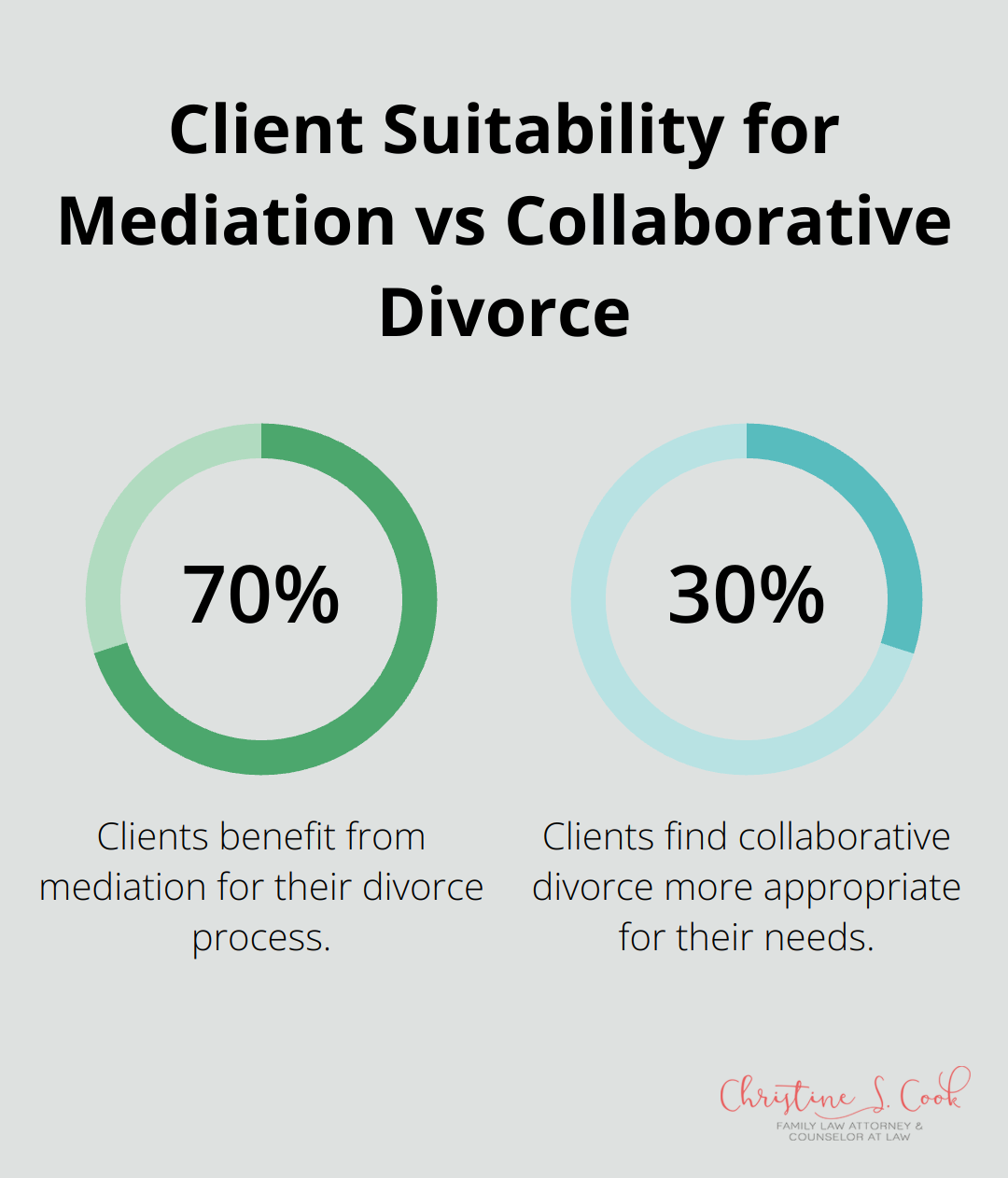Divorce can be a challenging process, but there are alternatives to traditional litigation. At Christine Sue Cook, LLC, we often get asked about collaborative divorce vs mediation.
These two approaches offer unique benefits for couples seeking a more amicable split. In this post, we’ll explore the key differences between collaborative divorce and mediation, helping you make an informed decision for your situation.
Collaborative divorce offers more flexibility, control, and confidentiality while Traditional Litigation puts decisions in the hands of a court. This method helps couples reach mutually beneficial agreements without court intervention. The process often leads to more satisfactory outcomes for all parties involved.
In collaborative divorce, each spouse hires their own attorney. These attorneys receive special training in collaborative law. Unlike traditional divorce (where lawyers often take opposing stances), collaborative attorneys work together to find solutions.
The process typically involves other professionals as well:
This team approach addresses all aspects of divorce comprehensively.

The collaborative process begins when all parties sign a participation agreement. This document commits everyone to resolve issues outside of court. If the process fails and litigation becomes necessary, the collaborative attorneys must withdraw. This creates a strong incentive to find workable solutions.
The team holds meetings with all members present. These sessions focus on identifying each spouse’s goals and concerns. The team then works to brainstorm solutions that meet everyone’s needs. This approach often results in creative solutions that a court might not consider.
Collaborative divorce can particularly benefit families with children. The process encourages parents to work together, which sets a positive tone for co-parenting after divorce. It also tends to reduce stress and time compared to litigation, allowing families to move forward more quickly.
Financial transparency stands as a key principle of collaborative divorce. In a collaborative divorce, both spouses have equal access to financial information, eliminating information asymmetry that can lead to distrust. This can lead to fairer divisions of assets and more sustainable financial arrangements post-divorce. While collaborative divorce isn’t always cheaper than litigation, it often provides better value for the money spent (both in terms of outcomes and emotional well-being).
Many couples find success through the collaborative process. It can preserve relationships, protect children from conflict, and lead to more satisfying outcomes. However, it’s not the right choice for every situation. In cases of domestic violence or severe power imbalances, for example, other approaches may prove more appropriate.
As we explore the various options for divorce, it’s important to consider another popular alternative: mediation. Let’s examine how this process works and its potential benefits for divorcing couples.
Divorce mediation presents an alternative to traditional litigation. This process involves a neutral third party, the mediator, who facilitates discussions between divorcing spouses. The goal? To reach mutually agreeable solutions without court intervention.
Mediation starts with an initial meeting. Here, the mediator explains the process and establishes ground rules. Subsequent sessions focus on specific issues such as property division, child custody, and financial support. The mediator guides these conversations, ensuring both parties have equal opportunity to express their needs and concerns.
Attorneys don’t always attend mediation sessions. However, clients often consult with lawyers between sessions to protect their rights. This approach can significantly reduce legal fees while still providing necessary guidance.
A skilled mediator acts as a neutral facilitator, not an advocate for either party. They help identify areas of agreement and disagreement, clarify misunderstandings, and suggest possible compromises. Mediators don’t make decisions for the couple but empower them to create their own solutions.
Mediators often have backgrounds in law, mental health, or financial planning. This expertise allows them to provide valuable insights into common divorce issues and potential resolutions.
Mediation offers several benefits:

While mediation offers many benefits, it doesn’t suit every situation. Mediation is not suitable for all divorces, particularly in situations involving domestic violence or significant power imbalances. A careful assessment of each client’s circumstances helps determine the most suitable approach for their unique needs.
As we explore the various options for divorce resolution, it’s important to compare mediation with another popular alternative: collaborative divorce. Let’s examine how these two processes stack up against each other in terms of cost, time investment, and overall effectiveness.
Mediation typically costs less than collaborative divorce. The rates charged by BLC neutrals and attorneys range from $450 to $700/hour and $125 to $225/hour for paralegals. These rates apply to both legal services and mediation services.
However, costs can vary widely based on case complexity and the couple’s ability to reach agreements. In some instances, the comprehensive approach of collaborative divorce can lead to long-term financial benefits that outweigh initial costs.
The duration of both processes can vary, but mediation often moves faster. Mediation cases typically conclude in 3 to 4 months, while collaborative divorces may take 6 to 18 months. This difference largely stems from the coordination required among multiple professionals in collaborative divorce.
Both methods offer more control than traditional litigation, but in different ways. Mediation empowers couples to make decisions directly, with the mediator facilitating discussions. Collaborative divorce provides a structured environment where decisions occur with professional guidance.
The level of control can impact satisfaction with outcomes. A study in the Journal of Family Issues found that mediated agreements had a 7% higher compliance rate than court-ordered settlements (suggesting increased satisfaction when parties have direct input).
Both approaches try to minimize conflict, but their methods differ. Mediation focuses on direct communication between spouses, which can improve future interactions, especially beneficial for co-parenting. Collaborative divorce often involves mental health professionals who can provide strategies for effective communication and co-parenting.
Research suggests that pre/postdivorce interparental conflict plays crucial roles in shaping child adaptation trajectories across the parental divorce process.
The choice between mediation and collaborative divorce often depends on case complexity and the couple’s dynamics. Mediation works well for couples who can communicate effectively and have relatively straightforward financial situations. Collaborative divorce is often better suited for complex financial cases or situations where more emotional support is needed.
Professionals assess each case individually to recommend the most suitable approach. Experience shows that about 70% of clients benefit from mediation, while 30% find collaborative divorce more appropriate for their needs.

Collaborative divorce and mediation offer valuable alternatives to traditional litigation. These methods prioritize open communication, mutual respect, and creative problem-solving, which often lead to more satisfactory outcomes for all parties involved. The choice between collaborative divorce vs mediation depends on the complexity of your case, your ability to communicate with your spouse, and your comfort level with direct negotiations.
At Christine Sue Cook, LLC, we understand that every family’s situation is unique. Our experienced team can help you navigate the decision-making process, providing expert guidance on whether collaborative divorce or mediation fits your needs. We will assess your specific circumstances and recommend the approach that aligns best with your goals.
Seeking professional advice is important in making an informed decision about your divorce process. The right approach can protect your interests and set the stage for a positive future. Contact us today to discuss your options and find the best path forward for your family.
